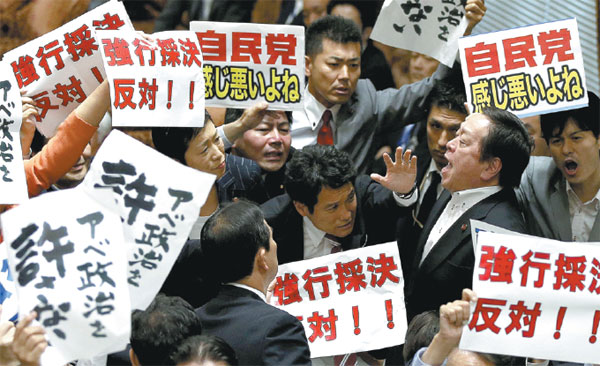Security bills signal fundamental shift in defense policy
Updated: 2015-07-20 09:36
By Cai Hong(China Daily)
|
||||||||
 |
|
Yasukazu Hamada (second from right), chairman of the lower house committee that approved the bills, is surrounded by opposition lawmakers after the vote on Wednesday. If the bills become law, Japanese troops will be able to fight abroad. Toruhanai / Reuters |
Young people protesting in front of Japan's Diet building where the ruling coalition railroaded two security bills on Thursday were voicing their concerns about the direction their country is taking.
They, among scholars, housewives and old folks, believe that the bills will drag Japan into US wars, despite Japanese Prime Minister Shinzo Abe saying, after the vote, they are absolutely necessary to prevent war.
The bills will change the missions for Japan's quasi-military Self-Defense Force. The first bill amends 10 security laws that would effectively remove the restrictions on Japan's right to exercise collective self-defense.
Last year, Abe's cabinet reinterpreted Article 9 of Japan's Constitution to allow this right. With the reinterpretation and this new bill, Japanese troops would be permitted to participate in a campaign under the justification of collective self-defense either when Japan's survival is at stake, or when a close ally suffers an armed attack and there are "no other appropriate means" to safeguard Japanese interests and citizens.
The second bill streamlines Japanese government's procedures to dispatch the SDF abroad to provide logistical support for an ally, removing the cumbersome necessity of having the Diet pass a unique, temporary law for each such operation.
Japan is forcefully asserting its interests in the region and on the world stage, both in collaboration with the US and other allies, and independently.
The country makes no secret of citing the "changing situation around Japan" - now familiar shorthand for a rising China - as the ruse for the new bills and its military buildup.
Speaking in Washington on Thursday, Japan's top military commander Katsutoshi Kawano said his country would possibly conduct patrols and surveillance activities in South China Sea in the future because he expects China to become increasingly assertive.
Ramming the bills through, rather than amending Japan's Constitution, has stretched the pacifist clause in the Constitution, in which Japan renounces war as a sovereign right and even vows not to keep a standing army. As a result of which, Japan's SDF, formed in 1954 and among the world's most sophisticated armed forces, cannot call themselves an army. The new bills carry deep implications for Japan's neighbors, as they signify a fundamental shift in Japan's defense policy. In fact, change started once Abe took office for the second time in December 2012.
The Abe cabinet unveiled new 10-year National Defense Guidelines and the country's first National Security Strategy in December 2013, outlining a drive to strengthen the Japan-US alliance, expanding Japan's military buildup in its southwestern maritime region facing China and building Japan's own network of alliances.
The Abe administration has lifted the decades-long ban on weapons exports, allowing Japan to jointly develop weapon systems with the United States and other countries. It has revised Japan's foreign aid charter, allowing Japan to fund the non-military operations of foreign forces. And early this year, the cabinet passed a record defense package worth 4.98 trillion yen ($42 billion), topping the previous peak set in 2002 and the third consecutive annual rise.
Japan and the US finalized a new set of defense cooperation guidelines during Abe's visit to the US in April. The guidelines emphasize an increasingly global role for the Japan-US alliance and are in line with Abe's vision of a "normal" Japan.
The concerns of Japan's neighbors about the country's unprecedented security policy shift are valid because Abe has revisionist views on history, including Japan's wartime atrocities, and constantly seeks to whitewash this shameful chapter in the country's past.
Abe's pursuit of the right to collective self-defense and remilitarization is fueling the uncertainty and tensions in the region.
The author is China Daily's Tokyo bureau chief.
caihong@chinadaily.com.cn
- Global health entering new era: WHO chief
- Brazil's planning minister steps aside after recordings revelation
- Vietnam, US adopt joint statement on advancing comprehensive partnership
- European border closures 'inhumane': UN refugee agency
- Japan's foreign minister calls A-bombings extremely regrettable
- Fukushima impact unprecedented for oceans: US expert

 Stars of Lijiang River: Elderly brothers with white beards
Stars of Lijiang River: Elderly brothers with white beards
 Wealthy Chinese children paying money to learn British manners
Wealthy Chinese children paying money to learn British manners
 Military-style wedding: Fighter jets, grooms in dashing uniforms
Military-style wedding: Fighter jets, grooms in dashing uniforms
 Striking photos around the world: May 16 - May 22
Striking photos around the world: May 16 - May 22
 Robots help elderly in nursing home in east China
Robots help elderly in nursing home in east China
 Hanging in the air: Chongqing holds rescue drill
Hanging in the air: Chongqing holds rescue drill
 2.1-ton tofu finishes in two hours in central China
2.1-ton tofu finishes in two hours in central China
 Six things you may not know about Grain Buds
Six things you may not know about Grain Buds
Most Viewed
Editor's Picks

|

|

|

|

|

|
Today's Top News
Liang avoids jail in shooting death
China's finance minister addresses ratings downgrade
Duke alumni visit Chinese Embassy
Marriott unlikely to top Anbang offer for Starwood: Observers
Chinese biopharma debuts on Nasdaq
What ends Jeb Bush's White House hopes
Investigation for Nicolas's campaign
Will US-ASEAN meeting be good for region?
US Weekly

|

|








